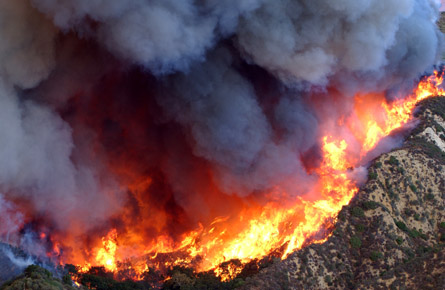The Government Cannot Protect You from Mother Nature
Click here to listen to the You Tell Me broadcast segment on Newstalk 600 KTBB Friday, Oct. 26, 2007
Before I begin, I want to get this out of the way.
I am not insensitive to the suffering of those in southern California who have lost their homes to raging wildfire. I cannot imagine losing everything that I have and I pray that I will never have such an experience.
With that said, I am tired of the demagogues that are out in force regarding this story. Here is the (highly predictable) menu:
- Man-made climate change has resulted in less rainfall and drier conditions that make wildfires more likely and more difficult to fight.
- The war in Iraq has depleted the National Guard such that it cannot adequately respond to the crisis.
- The Bush Administration is not doing enough to help those who have lost their homes.
Don’t believe any of it.
Here is the truth.
First, wildfires are natural phenomena. That area of California is engineered by nature to burn. It burns every fall. Some years the fires are worse than in other years but there is fire to deal with every autumn. The worst fire on record in SoCal occurred in 1936, long before the advent of the SUV or Al Gore’s movie.
Second, human force of any description is useless in the face of a 60-foot high wall of flame moving at 30 miles an hour. None of the equipment or manpower deployed in Iraq could possibly make a difference in fighting a fire fanned by 50 mile-per-hour winds across land that is predisposed to burn.
Third, the Bush Administration was early (just as it was during Katrina) in declaring a Federal Emergency and making available federal resources and money. (Unlike Katrina, the state and local governments in California are holding up their end in responding to the crisis.) Aside from that, there’s just really not a lot a president can do to stop a wildfire from consuming whatever is in its path. Further, there is little the president or his administration can do, aside from making available a finite amount of money and manpower, to undo what has been done by the superior forces of nature.
Implicit in all of the criticism being leveled by left-leaning politicians and media talking heads is the assumption that but for the failures of government, the suffering of those who have lost their homes in California would be greatly reduced or even avoided altogether.
Here’s the bad news. The government cannot protect you. If you build your home on a geologic fault, an earthquake can level it. Build in Liberal, Kansas, it can be swept away by a tornado. Choose to live on the coast in Gulfport, Mississippi, chances are a hurricane is going to dial your number. The government is powerless in the face of nature. To believe otherwise is to set one’s self up for eventual devastation.
Yet we have become so conditioned after a generation of believing in the efficacy and necessity of government involvement in all aspects of our lives that whenever natural disaster comes, and come it will, the immediate expectation is that the government will ride in on a white steed and make it all better. Just look at the coverage. You’re never more than a few minutes from a story on what the government is doing or should be doing.
This is not to say that the government doesn’t have a role in mitigating disaster. Firefighters are government employees. The planes and helicopters are all government assets. The fighting of the fire and the rescue of those who are in need is all being carried out by government at one level or another.
But to inflate the role of government to complete indemnification from catastrophe is just not realistic.
It is up to individuals, living freely in a free society, to assess the risks attendant to the choices they face and choose accordingly. The risk/benefit calculus is fatally skewed, however, if it assumes that government will ride to the rescue when, inevitably, some who chose to roll the dice wind up rolling a seven.
It’s not the government’s job to protect you. It’s your job to protect you. If you build your home in a disaster-prone area, you need to be able to afford the insurance premiums that a free market for insurance should command for indemnifying that risk. And you need to be willing to accept the consequences of the risk you freely assumed should those consequences come. If you cannot afford and/or stomach the risk, it is wrong to assume that your fellow citizens are obliged to assume it for you.
What’s happening to homes in southern California is terrible. That’s a big reason I will never live there.









I completely agaree. And to put it in another veiw, the less people we waste money on for their own mistakes, the more money we have to spend on truly desperate people.